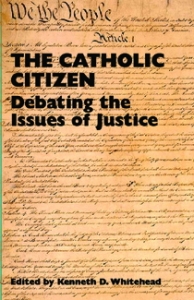
|
Posted January 27, 2005
Book: The Catholic Citizen: Debating the Issues of Justice Editor: Kenneth D. Whitehead St. Augustine Press, South Bend, IN, pp. 248 An Excerpt from the Jacket:
The Catholic Church today finds herself at the very center of some of the most important and controversial moral and social developments of our day, including abortion, capital punishment, cloning, so-called “gay marriage,” pacifism and the morality of war, the ethics of healthcare in a technologically advanced but morally deficient society, and other related subjects. The Fellowship of Catholic Scholars attempts to address issues such as these by inviting the best and most knowledgeable scholars and commentators to speak at its annual conventions. This book brings together the addresses and responses devoted to these topics at the Fellowship’s 26th annual convention in 2003. An Excerpt from the Book: Let me briefly address the question of justice. Is it uncharitable, or unjust, to insist on seeing the world as it is, thus bringing such unwanted facts to light? Many Americans, including a great many Catholics, seem to think so. But they are wrong. And they are wrong not only on grounds of theology — there are, after all, immortal souls at stake in this argument, including my own — but also wrong as a matter of this-worldly fact. It is no service to an already conflicted adolescent to say that society is indifferent to his sexual and emotional life, when in fact the option of active homosexuality will raise his risks for sexual abuse, alcohol and drug abuse, sexually transmitted disease, depression, and all the rest. It is no service to pretend moral equivalence between homosexual and heterosexual unions, when all the available evidence points overwhelmingly to the truth that heterosexual marriages are the best place for children. It is no service to any child – it is in fact evil — to be treated like an accessory to be procured, rather than like a human being with fundamental rights independent of those who would acquire them, including the right to be something other than an instrument of some unrelated adult’s personal drama. All of us need to be on the offensive, not the defensive, on these and other arguments, and we must also be alert to allies where we find them. Many people who do not say “yuk” to contraception do say “yuk” to polygamy, for example, which is why Standley Kurtz’s bold and influential recent essay on the subject in the Weekly Standard deserves mention here as a case in point. Kurtz’s argument – that homosexual “marriage” will demonstrably lead to polygamous “marriage,” spelled out in irrefutable detail — may not answer elemental questions of Catholic morality. At the same time, it is true that the gay rights boom will lead to polygamy, just as other instrumental arguments are also true – for example, that abortion can damage the mother’s health, that single-parent families are statistically more likely to produce criminals than are two-parent families, or that the public practice of homosexuality is fraught with documented perils. And it is also true that, living in an increasingly dissident and post-Christian time, non-dissident Catholics especially need to think creatively, and prayerfully, about how and where to make common cause. Anyone potentially moved by reason and evidence is potentially on the traditionalist side. All of this empirical knowledge is a mere footnote to natural law, it is true. But it helps to have the facts with us as we reach beyond the like-minded to the other-minded – including the gay-minded, whose hearts we hope also to touch. Today’s struggle over gay rights is the struggle over modernity, because the gay condition is in critical respects the modern condition writ large: its defiance, its sterility, its atomization, its unexplained compulsions and miseries, its insistence on public recognition as a substitute for private communion with God. I would like to close with a quote by a critic who, like many of the scholars here, understood the sadness of it all very clearly. “We must face things as they are. Much of the new sensibility regarding homosexuality fails to do so, and from such a failure no one, heterosexual or homosexual, can in the long run gain.” These words were written by Samuel McCracken in Commentary some 25 years ago, on the occasion of the publication of a massive study, Homosexualities, that proved a milestone in the effort to advance homosexual anti-traditionalism. Reading through that and related pro-gay literature of the time, McCracken could see plainly what I have been trying to describe: the self-destruction beneath so much of the happy talk, the problematic facts that just won’t go away. Table of Contents: Keynote address: Secularism, faith, and public policy John Finnis Meeting the Just Demands of Non-Traditional Households Introduction Gerard V. Bradley Empiricism and the “Anti-Traditional Household” Mary Eberstadt “Non-traditional Households” and “Just Demands” Christopher Wolfe Magisterial Teachings concerning “Non-Traditional Household” William May Legal Abortion Recent Developments in the Abortion Debate Patrick Lee An Exchange on Ethics of Embryo Adoption Embryo Adoption Appears to be Morally Licit William L. Saunders Frozen Embryo Adoptions are Morally Objectionable Rev. Tadeusz Pacholczyk Capital Punishment Evangelium Vitae and the Death Penalty Steven A. Long Catholic Moral Teaching and the Problem of Capital Punishment E. Christian Brugger Formal and Material Cooperation with Evil Lawyers and Cooperation with Evil in Divorce Rev. John J. Coughlin, O.F.M. Cooperation with Evil in the Military Profession John P. Hittinger Pacificism and Just War Just War Principles J. Brian Benestad A “Pacifist” Perspective in Seven Points Rev. Michael J. Baxter, C.S.C. Homily forthe 26th Sunday in Ordinary Time The Most Rev. Paul S. Loverde, Bishop of Arlington Reflections upon Receiving the Cardinal Wright Award Elizabeth Fox-Genovese Tribute to Father Ronald Lawler, O.F.M. cap., 1926-2003 |
|
